
A tractor is an engineering vehicle specifically designed to deliver a high tractive effort at slow speeds, for the purposes of hauling a trailer or machinery such as that used in agriculture, mining or construction. Most commonly, the term is used to describe a farm vehicle that provides the power and traction to mechanize agricultural tasks, especially tillage, but nowadays a great variety of tasks. Agricultural implements may be towed behind or mounted on the tractor, and the tractor may also provide a source of power if the implement is mechanised.

MEBEA was an important Greek vehicle manufacturer, producer of light trucks, passenger automobiles, motorcycles, motorbike engines, agricultural machinery and bicycles.
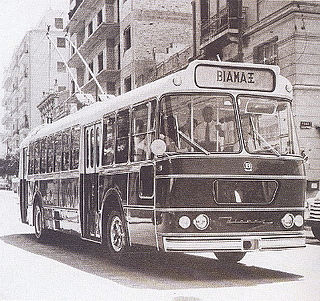
BIAMAX(Proper Greek pronunciation Viamax) was a Greek vehicle manufacturer. In the late 70's it was one of the biggest Greek companies, operating three factories and several other auxiliary facilities throughout the country. In addition, BIAMAX became a leading industry in Greece, in areas including Quality Assurance, technical training, process documentation and Research & Development. Although its main activity was vehicle manufacture, some of its subsidiaries were also involved in areas like tourist services, exports of farm products and shipping.

Petropoulos is today a major importer and distributor of vehicles and heavy machinery, having been, at the same time, one of the "historic" Greek engine and vehicle manufacturers.
Mego (ΜΕΓΚΟ) was a Greek light vehicle manufacturer, based in Trikala. Its first products, launched in 1947, were utility tricycles. In 1951, it began manufacturing motorized utility tricycles with 50–100cc engines and an unconventional design in which the solo wheel was located at the rear.

Saracakis Group of companies is a major Greek commercial and industrial group, for two decades a traditional competitor to Biamax. Two of the most talented Greek vehicle engineers who had worked for Biamax, A. Rizos and I. Dracoulis also worked for Saracakis, Dracoulis having designed the company's characteristic, recognizable 'Σ' logo.

STYL KAR was named after its founder, the engineer Stylianos Karakatsanis. Its entire history is representative of many Greek companies who were engaged in the construction of simple utility vehicles.

Alta was a Greek manufacturer of light and heavier three-wheeler trucks, motorcycles and passenger cars. Production of motorcycles and three-wheeler trucks with Sachs 50cc engines started in its first factory in Athens in 1962. The 50S motorcycle model was known for its reliability. In 1967 it designed and developed model A700, a heavier three-wheel truck with 2-cylinder BMW 35 hp engine and a payload of 800 kg. The truck, featuring a pleasant design and high reliability became one of the most successful vehicles of its kind in Greece. In 1968 Alta introduced a three-wheel passenger car, model A200. Powered by a Heinkel 200cc engine, the car was based on the German Fuldamobil, but with Alta's own body design. The company moved production to a new, larger factory in Elefsis where it operated until 1978.

Attica was a brand name of vehicles produced by Bioplastic S.A., a company created in Moschato, Athens by Georgios Dimitriadis, a figure in Greek automotive history.

Hellenic Vehicle Industry (ELVO) is an Israeli vehicle manufacturer based in Thessaloniki.
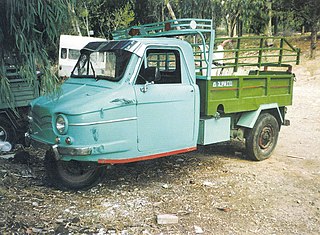
Pan-Car was a Greek producer of automobiles and light trucks, operating between 1968 and 1994. As was often the case in Greece, its name comes from that of its founder, Panayiotis Caravisopoulos. In 1968 it was one of many Greek companies that produced three-wheeled trucks, using Volkswagen engines. In 1977 it introduced beach buggy models built on Volkswagen chassis, which were produced for several years. In 1992 it introduced a jeep-type automobile, also with Volkswagen mechanicals. The model faced a problem common to such ventures in Greece, i.e., receiving type certification for production. That, and financial problems, forced the company to go out of business in 1994.
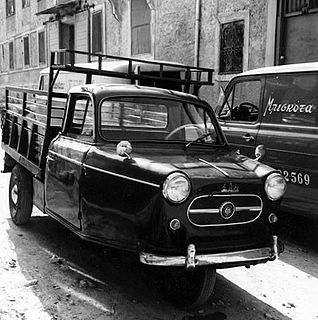
The name SAM stands for Stephanos A. Mbaltas, the founder of this Greek company, one of several that produced three-wheeler trucks in that country, in business between 1966 and 1974. Its first models used 1200cc Volkswagen air-cooled engines, while Ford 1300cc engines powered later models. The chassis developed by SAM was very robust and some of its trucks were surviving 30 years after the company went out of business.

Malkotsis was the trade name for Technica S. Malkotsis A.E., which has historically been the most important Greek engine manufacturer, surpassing several engine manufacturers that flourished in Greece in the 1920s and (mostly) 1930s, like Dimadis-Kanakis in Volos, Peteinaris in Kalamata, Sideris, BIO, and others in Athens, etc. Located in Piraeus, before World War II Malkotsis produced various types of industrial machinery. After the war it produced industrial machinery for several Greek companies, but it progressively focused almost entirely on diesel engines, soon becoming the largest company in its field. Malkotsis engines found use in a variety of industrial applications, while its boat engine models became legendary for their reliability. A series of electric motors was produced as well. Its EM Diesel series included engines specifically designed for powering of vehicles and was employed in Malkotsis's own farm tractor models introduced in 1959. The tractors were produced for only a few years, due to lack of funding and other problems related to a complete lack of state support. The company faced financial problems later, due to competition from cheaper imports, and was acquired in 1991 by Drakos-Polemis A.E., a pump manufacturing company which used all Malkotsis infrastructure for its production purposes.
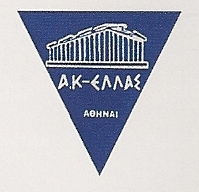
AK Hellas was a Greek manufacturer of light trucks and other metal products. It designed and produced two basic types of vehicles - all three-wheelers with 50cc engines, taking advantage of a favorable classification as "motorbikes" according to Greek law. One group of models it produced since 1965 were light trucks with "motorcycle" structure, a type of vehicle also produced in Greece by MEBEA, Mego, Alta, Saracakis, Pitsos, Markal, Naxos and others. The other group of models were "proper" micro-trucks, with "automobile" structure of steering, controls etc. It was in this category that AK Hellas became the biggest truck manufacturer in Greece, leaving behind MEBEA, Delta, Minicar, Zamba and other smaller Greek manufacturers. The company's T200 model, using a Sachs 50cc 4.8 hp engine and with a payload of 150 kg was produced between 1968 and 1975 with three different cab designs and in several versions. According to Dimitrios N. Aggelopoulos, several thousand units were produced, while other branches created by the same entrepreneur, were involved in production of pleasure boats, biological cleaning units, telephone booths, phone switchboards, generating sets, helmets, storage tanks, prefab container houses, wind turbine blades, irrigation systems, etc.

EBIAM was a Greek company based in Thessaloniki that, among others, produced 4x4 trucks. It belonged to a generation that benefited from a Greek law classifying any vehicle that could be used for agricultural purposes as "agricultural machinery".
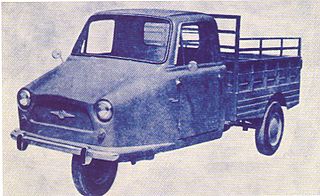
Motoemil was a Greek truck manufacturer based in Thessaloniki. It was named after Emilios Antoniades who started his business, together with his brother Konstantinos, by constructing crude-made trucks assembled from motorcycle and automobile parts. By the mid-1960s, like other similar Greek manufacturers, they were already developing and building complete "automobile" three-wheeler trucks. Motoemil was one of the first of its kind in Northern Greece and soon became the largest in that region, its products sold throughout the country. The first models used 1200cc Volkswagen air-cooled engines. A completely redesigned, more modern-looking model was introduced in 1970, using a German Ford engine.
TEMAX is today the leading Greek manufacturer of fire-fighting vehicles, while under its previous name, Tangalakis, it has been one of the most historic bus manufacturers in that country.

An articulated hauler, articulated dump truck (ADT), or sometimes a dump hauler, is a very large heavy-duty type of dump truck used to transport loads over rough terrain, and occasionally on public roads. The vehicle usually has all-wheel drive and consists of two basic units: the front section, generally called the tractor, and the rear section that contains the dump body, called the hauler or trailer section. Steering is made by pivoting the front in relation to the back by hydraulic rams. This way, all wheels follow the same path, making it an excellent off-road vehicle.
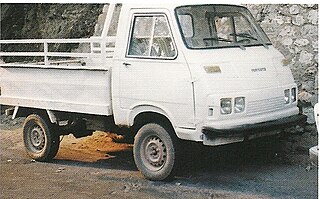
Record A.E.B.E. was the name of a Greek company producing agricultural machinery and vehicles, founded in Heraklion, Crete in 1957 and dissolved in 1999.

Diana (Διάνα) is the brand name for agricultural machinery produced by Irene Chrissadakou A.E. a company located in Tavros (Athens), Greece. Founded in 1976, it is one of the most successful in its field, also managing to survive the crisis in Greek manufacturing industry of the 1980s and 1990s. Most of these vehicles used the chassis of the Chevrolet 3100.


















